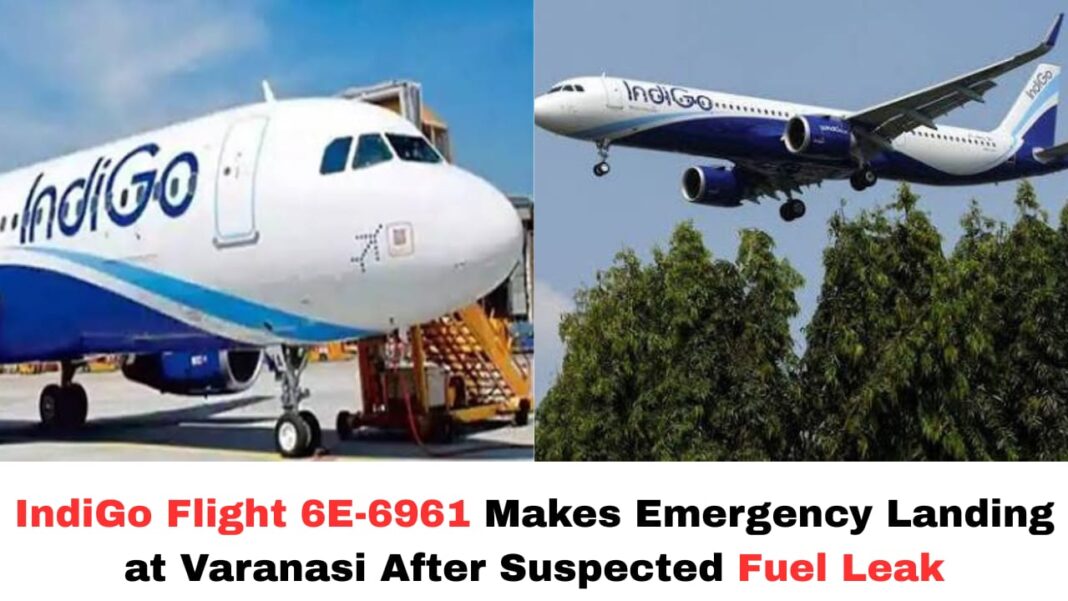Digital News Guru Uttar Pradesh Desk:
Mid-Air Fuel Leak Alert: IndiGo Kolkata-to-Srinagar Flight Diverts Safely to Varanasi
On the afternoon of October 22, 2025, what began as a routine domestic flight turned into a precautionary aviation-incident when IndiGo flight 6E-6961, en route from Kolkata to Srinagar, made an unscheduled diversion and landed safely at Lal Bahadur Shastri International Airport, Varanasi, after the crew reported a suspected fuel leak.
According to initial reports, the Airbus A320neo aircraft (registration VT-ITR) was carrying 166 passengers and crew when the pilot noticed an abnormal fuel-leak alert mid-flight. Recognising the potential severity of the situation, the pilot felt no delay was permissible and immediately contacted Air Traffic Control (ATC) at Varanasi to request a priority landing.

Within minutes the plane was cleared for landing, and at approximately 4:10 pm the aircraft touched down safely at Varanasi. Upon landing, all personnel on board were evacuated and safely escorted to the arrival hall. Fortunately, no injuries or casualties were reported.
What we know so far
- The flight number was 6E-6961, operating from Kolkata to Srinagar.
- The aircraft is an Airbus A320neo (VT-ITR).
- The suspected issue: a fuel-leak alert triggered mid-flight. Yet, authorities have flagged that the possibility of a false alarm due to a malfunctioning sensor cannot be ruled out.
- Post-landing, the aircraft was grounded for technical inspection, and the airline arranged an alternate aircraft to continue the journey for the affected passengers.
- Airport operations at Varanasi were reported as normalised after the incident. Investigations have been launched by the relevant aviation and airport authorities.
Why it matters
Incidents of suspected fuel‐leak in flight carry grave safety implications. Fuel systems in commercial aircraft are critical: any loss of fuel, uncontrolled leak, or mis-reading of sensors can rapidly escalate into a much more serious emergency. That this event was managed without injury speaks to the effectiveness of crew training, aircraft systems, and ATC coordination.
For the airline, this kind of event also tests operational resilience — from decision-making by the crew, to diversion procedures, to how swiftly passengers are looked after and flights re-scheduled.
From a broader perspective, in an aviation market as busy and competitive as India’s, such incidents can affect passenger confidence, regulatory scrutiny, and maintenance protocols.

What likely happened — and areas to watch
Scenario 1: Actual fuel leak
If the fuel leak was real, that would implicate the aircraft’s fuel lines, tank seals or pumps. Post-landing inspections will need to check for any fuel smell, visible drips, abnormal fuel consumption, or damage to components.
Scenario 2: False alarm / sensor malfunction
Some sources suggest the leak alert might have been triggered by a faulty sensor or system glitch. In such a case, although the aircraft may not have been leaking fuel, the pilot’s decision to divert is entirely justified — safety first. Nonetheless, maintenance must investigate and rectify the sensor fault, because such alerts undermine system reliability.
Key areas to watch:
- Final inspection report of the aircraft: what exactly was found?
- Whether any grounding or flight-stop is placed on similar aircraft until checks are completed.
- Communication by IndiGo to passengers and regulators, including any compensation or alternative arrangements.
- Follow-up on standard procedures: Did the crew follow all checklist protocols? Did the ATC diversion go smoothly with minimum disruption?
- Regulatory oversight: Will the Directorate General of Civil Aviation (DGCA) take additional steps or review maintenance/inspection records for the given aircraft or fleet?
How passengers were affected
The passengers on board experienced an unexpected diversion and delay. However, due to prompt action and coordination, the disruption was minimised and no one was harmed. Reports indicate the passengers waited in the arrival hall at Varanasi until alternate arrangements were made. The airline publicly stated that safety of passengers and crew remains their “top priority”.
For many passengers, the incident may cause anxiety; but professional handling and transparent communication can mitigate long‐term concerns. From this point, the airline may also need to handle flight-rescheduling, possibly compensation, and reassure customers about the aircraft’s airworthiness.

The airline perspective & next steps
IndiGo’s response was swift: grounding the aircraft for checks, arranging another airplane, and publicly acknowledging the incident emphasising safety focus. For the airline, next steps include:
- Completing the technical inspection and releasing the aircraft only when cleared.
- Reviewing whether similar aircraft (same type/model) or same maintenance batch require checks.
- Communicating clearly with regulators, passengers and stakeholders about findings.
- Possibly conducting a root-cause analysis to prevent recurrence and reassure the traveling public.
Conclusion
While no one wants to see an in‐flight issue, the fact that this incident ended safely — with no injuries and no worse outcome — is a positive. It highlights the importance of conservative decision-making by pilots, robust protocols within airlines, and efficient air-traffic control responses.
However, it also serves as a reminder: behind every commercial flight lies a complex network of systems, sensors, maintenance cycles and human decisions. Even one alert must be treated with utmost seriousness.
For IndiGo — and the Indian aviation industry — transparency about the investigation, learning from this incident, and demonstrating corrective action will help maintain and enhance public confidence.
Passengers on board the flight will no doubt remember their unexpected choice of airport (Varanasi) rather than Srinagar, but they will also likely feel relief. Going forward, the outcome of the investigation will matter as much as the diversion itself — because prevention is always better than cure in aviation.
You May Also Read: Belgium Court Clears Mehul Choksi’s Extradition to India in High-Profile PNB Scam Case








